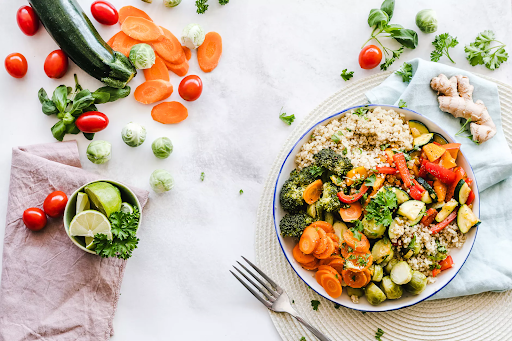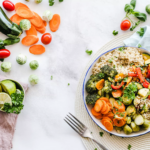How to Make the Most Out of a Vegetarian Diet
Photo via Pexels
Vegetarianism is on the rise. Thanks to a collective acknowledgment of the huge ecological impact of the meat industry, as well as a boom in the wellness and health foods industry that made meatless meals appealing, more people than ever are considering making the switch.
The vegetarian diet can indeed be a healthy, sustainable, and ethical one. It is not, however, automatically any of these things. In this guide, we will cover all the basics you need to know to ensure your vegetarian diet is good for you and good for the planet.
Types of Vegetarian Diet
“Vegetarian” is used to refer to several types of diets, including pescatarian (no meat but eats fish) and flexitarian (mostly vegetarian but occasionally eats meat). A vegan diet is fully plant-based (no animal products), but some non-vegans still restrict eggs or dairy. There is no “right” one. People pick their diets based on what works for them and what they believe they can stick to. It’s okay to experiment or even to not adhere to a strict set of dietary rules.
Health and Nutrients
Many people worry about the nutritional value of a vegetarian diet, but this worry is vastly overstated. Unless you are going fully vegan, the only thing you are removing from your diet is meat. All of the nutrients of meat can be found in fruits, vegetables, and pulses — even protein.
According to Healthline, vegetarian sources of protein include “meat substitutes” like seitan, tempeh, and tofu, but they are not the only option. More familiar (and cheaper) foods like lentils, chickpeas, nuts, spinach, and broccoli all contribute to your protein intake. Same goes for dairy and eggs, although these should be eaten in moderation due to their high fat content.
Other common deficiencies of a vegetarian diet include:
- Vitamin B12 – Found in some fortified plant milks
- Vitamin D – Found in eggs and dairy, but most commonly absorbed by sunshine
- Omega-3 Fatty Acids – Found in eggs, flaxseed, and walnuts
- Zinc – Found in many beans and legumes
- Iron – Found in leafy vegetables and legumes
A healthy vegetarian diet is one filled with whole foods such as vegetables, legumes, and whole grains. This will not only provide you with the nutrients you need, but it will also be gut-friendly due to high levels of fiber you’ll consume. This is important since your gut biome regulates mood, digestion, and your immune system. You can boost this effect by eating fermented vegetarian foods like miso, kefir, sauerkraut, yogurt, or pickles.
Remember that just because something is plant-based doesn’t mean it’s healthy. There are many unhealthy vegan foods, from ultra-processed meat replacements to sugary yogurts and froze meals. As with any diet, the rule of keeping processed foods to a minimum while cooking most of what you eat is a good one.
Ethical and Eco-Friendly Vegetarianism
As outlined above, simply cutting out (or reducing) meat from your diet is already a great eco-friendly step. Its ethical credentials also extend to those who do not agree with the treatment of animals in the meat industry, or who do not believe in eating animals at all.
However, that doesn’t mean a vegetarian diet is inherently sustainable and ethical. Below are a few ways you can ensure that your vegetarian diet is actually kind to the planet and to animals:
- Buy local produce to cut down on transport emissions. Farmer’s markets are the best place to do this; use the USDA Farmer’s Market Directory to find your closest one
- Avoid unsustainable foods. While many of these are meat or dairy-based, some popular vegetarian foods like almond milk and white bread are also bad for the environment
- Buy free range eggs
- Plan your meals to minimize food waste, or use a food delivery system
Whatever your motivation for going vegetarian is, make sure you do it right. How healthy and sustainable your vegetarian diet is will ultimately be up to your individual choices. The good news is that, by its very nature, vegetarianism makes it easier for you to make these positive choices. Focus on learning to plan and cook tasty, enjoyable meat-free meals from fresh, sustainable ingredients — the rest will follow.




